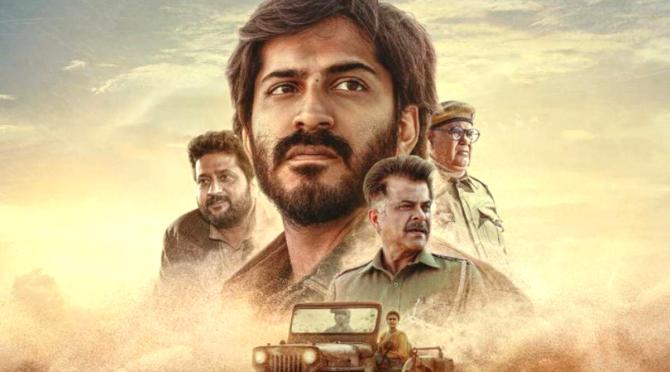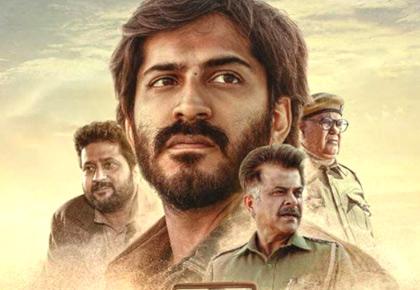
[ad_1]
Tar doesn’t make a fuss on screen,” sighs Sukanya Verma.

The difference between the still and the dead distinguishes the western from the impostor.
Where the mood of one can change at any moment and develop into danger and surprise, the other walks in circles in an empty, endless area.
Written and directed by Raj Singh Chaudhary Tar positions himself unperturbed, desi Western, but does not cause excitement on the screen.
It is likely that producers and protagonists Anil Kapoor and son Harsh Warrdan had the genre’s lyrically violent and deviant image in mind, a description that DoP Shreya Dev Dube’s gritty visuals powerfully convey. Except Tar so fascinated by the possibility of a spectacle in his dry countryside that he neglects to breathe life into his ordinary schemes.
Tar starts with some anticipation.
Anil Kapoor’s weary voice-over is reminiscent of an episode from 1985 that turned his day-to-day existence as a miserable police inspector on its head.
In Munabao, a remote village in the state of Rajasthan – close proximity to Pakistan makes it a breeding ground for border trespassers and opium smugglers – Kapoor investigates the brutal murder of a local resident.
So far, he hasn’t done anything significant in his career and is due to retire in a couple of months.
His partner (the excellent Satish Kaushik) resigned himself to a similarly uneventful fate.
They may not have excelled as cops, but they accepted it anyway.
This is how Kaushik’s subordinate sees it,Naukri mein kamse kam jaat vardi mein chup jaati hai’ alluding to the deeply rooted caste system he is forced to adhere to.
But the search for the missing parts of a new dangerous crime, participation in shootouts and jeep chases instills a new sense of relevance.asli police-shaft kam‘ in them.
The late-bloomers’ latest effort is not a new scenario, but one that remains attractive given Anil Kapoor and Kaushik’s longtime friendship and collaboration. Their free acquaintance can be seen in the scenes, whether they enjoy food from laal maas or chase a gang of robbers.
This is the edge Tar this left me intrigued, but that’s what he focuses on most fleetingly.
Instead, most of the screen time goes to the arrival of a sleazy mysterious stranger.
The stern Vardhan introduces himself as Siddharth and rents a room in the house of Chetna (Fatema Sana Sheikh).
Chetna is the disillusioned wife of Panna, a village laborer (Jitendra Joshi) whom Siddharth wants to hire along with a bunch of others in connection with his antique business.
The duo share an instant attraction, which would be a good thing if it wasn’t so hopelessly contrived and awkward.
The cat doesn’t mind.
‘Angrezi painting ka hero Lagta Haihe applauds as his boss wonders if the timing of the appearance of Kapoor Jr. and the violence in the village is just a coincidence.
Amid stylized portrait-ready shots of village locals and bleak, arid images of the region, a dry tale of violence and retribution unfolds that leaves us wondering whether it’s about angry smugglers, revenge-seekers, or ruthless cops.
What he lacks a lot is cunning.
Tar too deliberate in its ambiguity and objectivity to confuse the viewer with prolonged tension.
Scenes and scenes of bloody torture, interspersed with silence devoid of intelligence, fizzle out, although the typical features of the genre are grubby faces of passers-by, a lonely tree in the desert, a lonely animal in the desert, a terrible whistle and traces of unpleasant memories. flash in the frame and out of the frame.
Anil Kapoor as a fashionable cop riding a bike in a trendy leather jacket and shiny sunglasses is a mesmerizing sight. He is just as solid in his artistry.
Only the movie in Kapoor’s head is not a movie in which Kapoor plays the lead role. Tar if he had at least a quarter of his weight, everything would be much better.
Its languid pace, softly told narrative doesn’t help the languid intensity of Harsh Warrdan. His character is not downplayed, he is simply absent.
Nothing in his identification with Fatima’s teasingly depicted damsel in distress makes sense. And the complete lack of chemistry between them only makes it doubly inappropriate in the process.
The lines of the author of the dialogues Anurag Kashyap sting with their cruelty and rudeness.
Women in Tar are his frequent victims, but the bawdy beauty Mukti Mohana makes a meal out of it and becomes the only sass in a dull deal.
Clint Eastwood could very well be talking about the western genre in Good bad evil when he famously said, “There are two types of people, my friend. Those with loaded guns and those who dig. You are digging.
Tar too pretentious to do anything else.
Tar is streaming on Netflix.
Rediff Rating:


[ad_2]
Source link